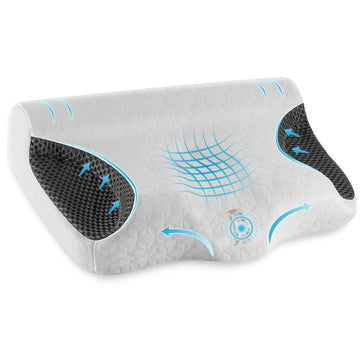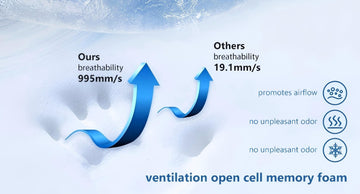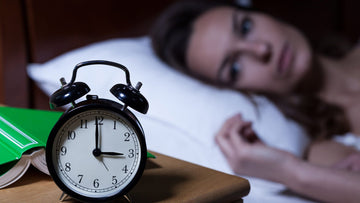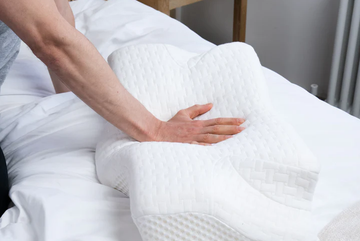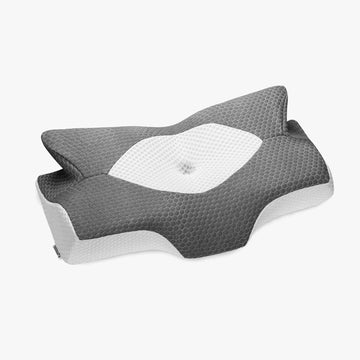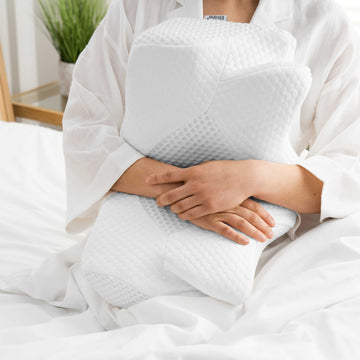Blog
How a CPAP Pillow Can Transform Your Sleep Apnea Experience at Any Age
by Team Elviros on Jul 23, 2024
The common disorder known as sleep apnea is characterized by frequent disruptions in breathing while sleeping. These pauses may happen hundreds of times a night and cause disrupted sleep, daily tiredness, and major risks to health if left untreated. The National Council on Aging, 2024 estimates that 39 million people in the USA have sleep apnea, many of which go unreported.
Although CPAP therapy is a very successful treatment for sleep apnea, the bulky masks and tubes may make it difficult to obtain a decent night's sleep. Also, in the same study, 33 million U.S. individuals, including President Joe Biden, use CPAP machines. To properly treat sleep apnea, this article explores the function of CPAP (Continuous Positive Airway Pressure) treatment and the advantages of utilizing a CPAP pillow.

Sleep Apnea and the Role of CPAP Therapy
Sleep apnea is the result of excessively relaxed throat muscles that either narrow or block your airways during sleep. This obstruction causes short pauses in breathing by preventing oxygen from getting to your lungs. Loud snoring, periods of breathing stopping while sleeping, sudden awakenings followed by gasping or choking, and daytime lethargy are all symptoms of sleep apnea. There are three main types of sleep apnea:
-
Obstructive Sleep Apnea: OSA most usually manifests when relaxed throat muscles restrict the airway. Studies have indicated that OSA is a risk factor for high blood pressure, heart disease, stroke, and possibly diabetes.
-
Central sleep apnea: Less frequent this type is as a result of the brain failing to deliver instructions to the muscles regulating respiration.
-
Mixed sleep apnea: A mix of central sleep apnea and obstructive sleep apnea for sleep.
Symptoms of sleep apnea can include:
-
Loud snoring
-
Witnessed breathing pauses during sleep
-
Gasping or choking during sleep
-
Daytime fatigue (affects up to 80% of OSA sufferers)
-
Morning headaches
-
Difficulty concentrating
-
Mood swings
Other health risk factors are obesity, a family history of the disorder, a narrow airway, persistent nasal congestion, smoking, and several medical disorders including type 2 diabetes and high blood pressure. If ignored, sleep apnea may cause major problems like diabetes, high blood pressure, heart disease, and stroke.

CPAP Therapy
If you feel you have sleep apnea, you should see a doctor for a diagnosis and treatment. The gold standard for addressing sleep apnea is CPAP therapy. For moderate to severe obstructive sleep apnea, CPAP therapy is the primary treatment. It's employing a CPAP machine, which keeps the airways open during sleep by continuously stream of air delivered via a mask. This constant airflow helps the airway not to collapse, hence lowering snoring and apnea occurrences. CPAP therapy has a solid track record of success. It improves sleep quality and helps to reduce the related health hazards as well. According to the National Institutes of Health, many times, patients report notable increases in cognitive ability, mood, and energy level. CPAP therapy has been shown to greatly increase sleep quality, decrease daytime tiredness, and lessen the risk of related health issues.
Benefits of Using a CPAP Pillow Compared to Regular Pillows
Even while CPAP therapy works, the masks and tubes may be awkward and heavy. Studies in another study by the National Institutes of Health point to nasal discomfort as a main cause of some patients quitting CPAP therapy. The particular requirements of people receiving CPAP therapy are met by a CPAP pillow, a specially shaped orthopedic contour pillow.
There are several ways CPAP pillows can be more beneficial compared to regular pillows:
-
Enhanced Comfort and Compliance: Even while CPAP therapy works, the masks and tubes may be awkward and heavy. Keeping compliance is one of the key difficulties of CPAP treatment. Another study by the National Institutes of Health points to nasal discomfort as a main cause of some patients quitting CPAP therapy. By offering a pleasant and supportive sleep surface that fits the mask, a CPAP pillow solves this problem. This may greatly improve comfort, therefore facilitating patient adherence to their treatment.
-
Improved Sleep Quality: A CPAP pillow promotes a more peaceful and continuous sleep by providing optimal spinal alignment and lowering mask pressure. The strategic cuts and curved shape help to reduce air leaks, therefore guaranteeing the CPAP machine's best performance all through the night.
-
Alleviation of Pressure Points: For side sleepers especially, traditional pillows might cause pressure points. These pressure points are relieved by the design of a CPAP pillow, which lowers the possibility of waking up with uncomfortable areas on the neck and face. The whole sleep experience may be much improved by this additional comfort.
-
Supports spinal health: For spinal health, a good sleep position is really vital. A CPAP pillow's orthopedic contour helps the spine naturally curve, therefore lowering the risk of neck and back problems. Those with pre-existing spinal problems who may find standard pillows insufficient can particularly benefit from this.

Investing in a CPAP pillow can greatly improve the comfort and effectiveness for CPAP users. Its unique design accommodates the mask and tubing, reducing discomfort and air leaks. This promotes better sleep quality and overall health, making it a valuable addition for those with sleep apnea.
Choosing the Right CPAP Pillow
There are many CPAP pillows on the market; the correct one will rely on your tastes and demands. These key components should help you to think through:
-
Sleeping position: You sleep on your back, side, or stomach mostly? While some pillows are more versatile, others have ergonomic designs, especially for side sleepers.
-
Mask type: Complete face masks need different accommodations than nasal masks. Select a CPAP mask-compatible cushion with cradles or cutouts matching your mask type.
-
Material: Made from premium Memory foam, water pillows, and other materials, their degrees of comfort and support vary. Think about your tastes in breathability and stiffness.
-
Adjustability: Some pillows let you change the loft or filling to fit your degree of comfort. If you find other pillows either too high or low, this may be beneficial.
-
Hypoallergenic Cover: The hypoallergenic design of the removable and washable cover guarantees a clean and healthy sleeping environment.
Additional Tips for CPAP Therapy Success
-
Practice daily use of CPAP machines to reduce anxiety and make nighttime use more natural.
-
Moisturize nasal passages to prevent congestion and discomfort. Saline nasal sprays or humidifiers can help.
-
Maintain a consistent sleep schedule to regulate the sleep cycle and improve therapy effectiveness.
-
Regularly clean CPAP masks and equipment as per manufacturer's instructions.
-
Consult with a doctor if experiencing any problems to troubleshoot and maximize treatment.
Despite being a severe disorder, sleep apnea may be treated. A CPAP pillow may be a useful item to increase your comfort and therapy adherence while CPAP therapy is a very successful option. Following these guidelines and investigating the possible advantages of CPAP pillows can help you to regulate your sleep apnea and provide the peaceful sleep you so deserve. Recall that your general health and well-being depend on a night's sleep quality.

